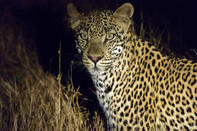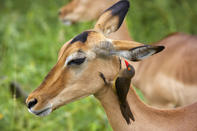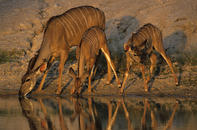Changing Attitudes

In the beginning, the National Parks Board was resistant about the Makuleke’s claim to the Kruger Park Land. As Lambson Makuleke (a member of the Makuleke) says “It was still the board of yesterday. They objected to the claim and their attitude was very negative.
It was one of the first and they didn’t believe that we would achieve with our endeavours.” Then, the old Parks Board was transformed into a new organisation, SANParks and attitudes began to change.
Once their claim had been declared legitimate, the Makuleke community held a number of discussions to decide what to do with the land. The elders of the village still had strong emotional ties to the Pafuri and wanted to return. The younger people, however, had grown up in Ntlhaveni and didn’t want to move back into the remote wilds.
A SANParks Partnership

Lambson Makuleke, an active participant in the process, describes it like this: “The whole community made a decision after several meetings of discussing the issue. We looked at the advantages and disadvantages, and at the end of the day, the whole community bought into the idea that we need to retain the status quo (of Pafuri) as a bio-diversity area or conservation area.” With the decision taken, SANParks entered into negotiations with the Makuleke to iron out the details.
A Conservation Management Plan was drawn up and a joint-management board was established. The Makuleke community officially reclaimed their land in 1998. This strip of pristine bush between the Luvuvhu and Limpopo rivers is now known as the Makuleke Concession Park. Technically, the land is owned by the Makuleke and managed in partnership with SANParks, as a contractual park.
The Makuleke also have the sole right to operate hotels, lodges and game drives within their territory, and they have granted several concessions to tourism companies. The money made from the concessions is paid over to a Communal Property Association, a registered legal entity, and the funds are then allocated by a committee to the three Makuleke villages around Ntlhaveni.
New schools, improved electricity supplies and other developmental projects have already been started, and most members of the community seem pretty satisfied with the way things are going. There are also around 100 Makuleke being directly employed by the concessionaires and this contributes more money to the community.
The Pafuri Camp

The Makuleke decision makers have no intentions of over-developing their little piece of heaven. Only two luxury lodges, Pafuri Camp (formerly run by Wilderness Safaris, now run by ReturnAfrica) and The Outpost, have been established (with a total of 116 beds), and an upmarket eco-training camp operates in the concession area.
ReturnAfrica also runs walking trails and the upmarket Baobab Hill Bush House in the Pafuri. The idea is to generate income from a small number of visitors who pay quite a bit for their accommodation, as opposed to creating a mass tourist product that would require lots of guests to make the same money.
Unfortunately, this means that an overnight stay in the Makuleke Concession Park is probably out of reach for most local visitors. Furthermore, Kruger National Park vehicles are not allowed to traverse the concession area, so game drives are only available to guests of the concession lodges. But don’t despair. The tar road from Punda Maria to Pafuri Gate is open to everyone, so you can still sample this remarkable landscape for yourself.
By David Fleminger This one of a kind private house is situated in the Makuleke Contract Park in the Kruger National Park an ideal location for families or a g...
This one of a kind private house is situated in the Makuleke Contract Park in the Kruger National Park an ideal location for families or a g... The park authorities had to break a number of eggs to make the Kruger National Park omelette. The consequences of these land claims could be...
The park authorities had to break a number of eggs to make the Kruger National Park omelette. The consequences of these land claims could be...